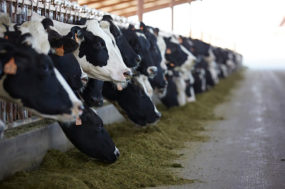On a video call with fellow Hudson Institute coaches, one coach quoted Andrew Grove, who was the COO of Intel, as saying, “A crisis always ends. What matters is how we come out on the other side.”
We have to put a crop in and tend to livestock, but we also have some gifts of time now. “Do not waste the crisis, as there are opportunities to discover,” said Norm Trainor of The Covenant Group Ltd., encouraging businesses to thrive in times of uncertainty.
Clarity of expectations, certainty of timelines and agreements, and a commitment to action are the three C’s I have been sharing with farm families for a long time. Let’s take a next-step approach to seize questions to find clarity and create more certainty.
What is your current vision for your family, your farm and your ownership? Here’s a few vision categories for you and your family to consider right now.
Family vision: guiding principles, values, connectedness, harmony, communication
I think the article “How Family Businesses Can Respond to the Pandemic: Collaboration, Openness and Sharing the Burden” from forbes.com is a great read on how family discussions of the current reality can build security and a sense of confidence. We need to have austerity plans and cope with losses.
Farm vision: business plan, compensation, contingency plans, decision-making systems to deal with future uncertainty, business values, alignment with farm goals
Ownership vision: succession plan, estate plan, transfer of wealth, enjoyment of new roles, ownership
Trainor coaches us to work on strategy, structures, systems, processes and financial management during a crisis. He says, “Now is the time to redefine our performance, our work.” BDO Canada is developing a new financial benchmarking report for the grains, beef and dairy sector. Are you using benchmarking and “farming the numbers” on your operation?
This might sound like hard work, but when you measure what matters and give everyone a voice on your farm team, you will be creating an attractive, profitable farm culture. It’s all about what you believe, your core values and vision as a family. It’s about how you behave in the family dynamic and in the business arena, and then how you make decisions.
Believe.
Behave.
Decide.
This is the glue that is going to anchor you well through the winds of this current storm. Sharing your fears, your ideas and your healthy ways to cope with loss will make all of you stronger. Dr. Nikki Gerrard’s research, called “What doesn’t kill you makes you stronger,” found that communication, connection with community and ability to celebrate gives farm families resilience in tough times.
Performance appraisals of family members are rare on most farms, as labour is precious, and many people “put up and shut up” rather than address conflict resolution. Daily feedback as to what is working well and what could be improved are good conversations to keep performance in check.
The ability to express your emotions and create solutions are two very positive conflict skills to hone in times of high stress. Courageous conversations should be part of family meetings and can be facilitated by an outside party, if necessary. As tensions are high with the added disruption of a pandemic and its necessary life-changing adaptations, we need to be really intentional how we manage our stress and conflict on a daily basis.
Let’s remind each other that we cannot read each other’s minds. Family business meetings are key to getting action and resolving conflict in a safe and respectful manner. Decide if your goals are for the operation of the farm business and have a production, operational meeting. If you are more concerned about setting strategy to define transition plans and processes, then focus on meetings to look at the farm business agreements for operating, owning and wealth transfer.
Talking as a family business and giving everyone a respected voice at the table will help you navigate this new adventure and disruption with a deeper sense of security and confidence. We need to creatively cope with our losses and ask for help to find practical ways to keep farming well, profitably and long. ![]()
Elaine Froese, CSP, CAFA, CHICoach, farms in southwest Manitoba near Boissevain with her husband, son and daughter-in-law. She is here to listen and coach farm families to discover a workable vision. She works through video chats and the phone. Calls and texts from the tractor cab are welcome at (204) 534-7466. Find tools and books at Elaine Froese. ![]()
PHOTO: Staff photo.

-
Elaine Froese
- Certified Farm Family Coach
- Email Elaine Froese
Helpful questions to get you started
• What is your vision for family participation in the farm business?
• What is most important to you?
• What do you think is best for the farm? (Sharing financial realties is important here.)
• What do you think is best for the family?
• Who gets to farm with you? Based on what criteria (education, skills, other work experience, conduct)?
• Who ultimately gets to decide who is on the farm team?
• Do you love the roles you have on your farm today?
• What does management need to do to support your goals and roles?
• What are the biggest strengths you bring to the farm?
• What are some of the areas that need improvement?
• What is your learning plan to grow more skilled?
• Is everyone on the farm team happy with how they are compensated?
• Is 2020 deemed now to be a “lean and mean” kind of year? What family income level is enough and reasonable?
• Do you know what farm perks are covering for your family’s lifestyle?









